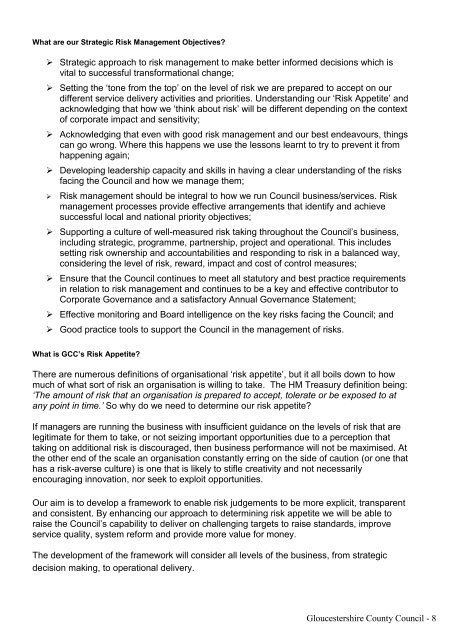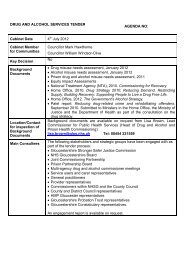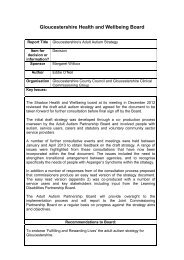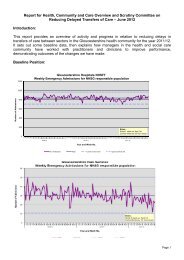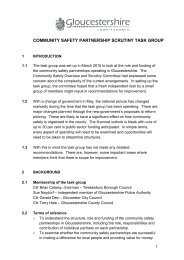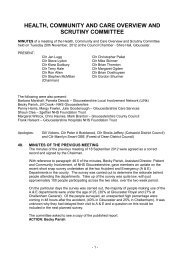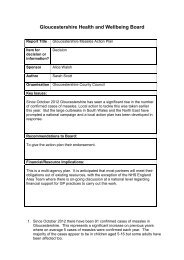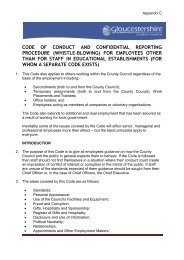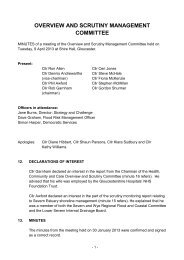Agenda item 4 - MTFS (Final) Cab 070213 , item 9. PDF 1 MB
Agenda item 4 - MTFS (Final) Cab 070213 , item 9. PDF 1 MB
Agenda item 4 - MTFS (Final) Cab 070213 , item 9. PDF 1 MB
You also want an ePaper? Increase the reach of your titles
YUMPU automatically turns print PDFs into web optimized ePapers that Google loves.
What are our Strategic Risk Management Objectives?<br />
‣ Strategic approach to risk management to make better informed decisions which is<br />
vital to successful transformational change;<br />
‣ Setting the ‘tone from the top’ on the level of risk we are prepared to accept on our<br />
different service delivery activities and priorities. Understanding our ‘Risk Appetite’ and<br />
acknowledging that how we ‘think about risk’ will be different depending on the context<br />
of corporate impact and sensitivity;<br />
‣ Acknowledging that even with good risk management and our best endeavours, things<br />
can go wrong. Where this happens we use the lessons learnt to try to prevent it from<br />
happening again;<br />
‣ Developing leadership capacity and skills in having a clear understanding of the risks<br />
facing the Council and how we manage them;<br />
‣ Risk management should be integral to how we run Council business/services. Risk<br />
management processes provide effective arrangements that identify and achieve<br />
successful local and national priority objectives;<br />
‣ Supporting a culture of well-measured risk taking throughout the Council’s business,<br />
including strategic, programme, partnership, project and operational. This includes<br />
setting risk ownership and accountabilities and responding to risk in a balanced way,<br />
considering the level of risk, reward, impact and cost of control measures;<br />
‣ Ensure that the Council continues to meet all statutory and best practice requirements<br />
in relation to risk management and continues to be a key and effective contributor to<br />
Corporate Governance and a satisfactory Annual Governance Statement;<br />
‣ Effective monitoring and Board intelligence on the key risks facing the Council; and<br />
‣ Good practice tools to support the Council in the management of risks.<br />
What is GCC’s Risk Appetite?<br />
There are numerous definitions of organisational ‘risk appetite’, but it all boils down to how<br />
much of what sort of risk an organisation is willing to take. The HM Treasury definition being:<br />
‘The amount of risk that an organisation is prepared to accept, tolerate or be exposed to at<br />
any point in time.’ So why do we need to determine our risk appetite?<br />
If managers are running the business with insufficient guidance on the levels of risk that are<br />
legitimate for them to take, or not seizing important opportunities due to a perception that<br />
taking on additional risk is discouraged, then business performance will not be maximised. At<br />
the other end of the scale an organisation constantly erring on the side of caution (or one that<br />
has a risk-averse culture) is one that is likely to stifle creativity and not necessarily<br />
encouraging innovation, nor seek to exploit opportunities.<br />
Our aim is to develop a framework to enable risk judgements to be more explicit, transparent<br />
and consistent. By enhancing our approach to determining risk appetite we will be able to<br />
raise the Council’s capability to deliver on challenging targets to raise standards, improve<br />
service quality, system reform and provide more value for money.<br />
The development of the framework will consider all levels of the business, from strategic<br />
decision making, to operational delivery.<br />
Gloucestershire County Council - 8


